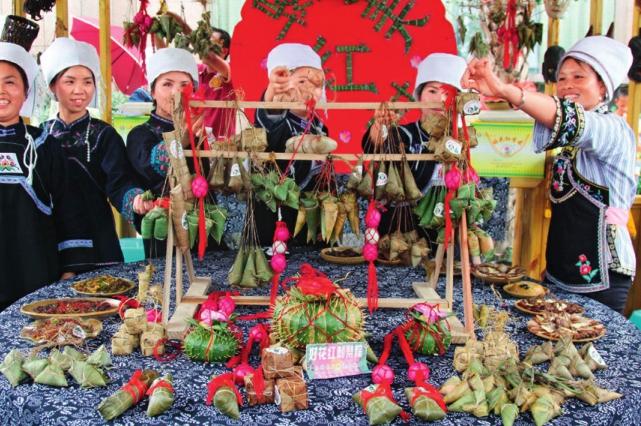The Dragon Boat Festival:Combining Boat Racing with Tradition
By staff reporter DANG XIAOFEI

THE Dragon Boat Festival is a traditional Chi- nese festival which originated from the worship of celestial phenomena, and evolved from Dragon totem sacrifice in the remote ages. The festival falls on the fifth day of the fifth lunar month(June 7 on the solar calendar 2019). To celebrate the Dragon Boat Festival, people pray for blessings and protection against calamities with vibrant and colorful festivities. The Dragon Boat Festival began to be observed around the Spring and Autumn Period and the Warring States Period more than 2,000 years ago.
Origin
The Dragon Boat Festival was initially held to offer sacrifices by the ancient Yue tribes (in southern regions in the middle and lower reaches of the Yangtze River) who worshipped dragon totems. As early as the Spring and Autumn Period (770-476 BC), the Yue tribes honored the dragon, which they recognized as their ancestor, by staging dragon boat race on the fifth day of the fifth lunar month. Over the following centuries, most of the Yue people merged into the Han ethnic group, while the rest evolved into various minority groups in the south. As a result, the Dragon Boat Festival has gradually become a festival of the whole Chinese nation.
The Dragon Boat Festival, the Spring Festival, the Qingming Festival, and the Mid-Autumn Festival are known as the four major traditional festivals of China. Since 2008, the Dragon Boat Festival has been listed as a national holiday. In 2009, UNESCO formally approved the inclusion of Chinas Dragon Boat Festival into the list of the worlds intangible cultural heritage.
Legends
There are many interesting legends about the Dragon Boat Festival, with the story of “commemorating Qu Yuan” being the most popular one.
Qu Yuan was a minister of the Chu State in the Spring and Autumn Period. He was honest, concerned about his state and the people, and devoted to reform, but certain enemies of his consistently made false allegations against him. The king was easily misled, ignorant of the distinction between loyalty and treachery. Lending a ready ear to slander, the king drove Qu Yuan out of the capital and exiled him to a remote region. On his way to exile, Qu Yuan wrote poems which become popular such as Lisao(The Lament), Tianwen (Heavenly Questions) and Jiuge (Nine Songs), which expressed concerns about the fate of the state.
Later, the Qin State defeated the Chu State. As the Chu State perished, Qu Yuan, a loyal and patriotic man, was so sad that he decided to end his life. On the fifth day of the fifth lunar month, after writing his masterpiece Embracing Sand, he jumped into the Miluo River (now in Hunan Province) with a stone in his arms, in grief, indignation, and despair.

